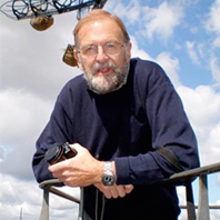Obituary
Issue: The Mobile Microbe
08 November 2016 article

Professor Julian Wimpenny
MARCH 27 1936–JANUARY 7 2016
Emeritus Microbiologist and ingenious innovator, Julian William Thomas Wimpenny was an example of a true Renaissance man.
Julian, a leading microbiologist of his generation, was as adept at glassblowing as in devising, fabricating, and interfacing fermentation equipment; he was a consummate hands-on research laboratory scientist. Also a first-rate lecturer and supervisor for young students, he enthused and communicated these facilities to us all and to the successive generations privileged to work with him.
Pure monocultures of microbes growing in liquid suspensions never entirely satisfied him, and his application of his own novel techniques revolutionised and re-invigorated our discipline. This innovative approach propelled him from the traditional era of shake flask and continuous culture microbiology to his newly invented gradient plates and ‘gradostat’ devices, providing simultaneously multiple graded environments for selection and optimised growth of micro-organisms. Microelectrode measurements on bacterial colonies led to analogies with growth of tissues. Use of the constant depth thin-film fermenters led him to consider the problems of surface growth of mixed populations in biofilms in the real world of dental plaque and serious problems of microbial metal corrosion.
Microbial ecology, in laboratory and computer models, but also studies of spoilage in the food industry followed, and developed into exciting ideas about ‘extremophiles’ in space. Julian’s last written works were a comprehensive review on biofilms and a survey of the limits to microbial life.
Julian instigated the Computer Users’ Group of the then Society for General Microbiology, and the Biofilm Club; his infectious enthusiasm always ensured the success of new enterprises.
Born at Lowestoft, where his father was the Director of the Fisheries Laboratory, Julian was a boarder at the Leighton Park Quaker School then spent a year at the Sorbonne. At Emmanuel College, Cambridge, he read Life Sciences and his PhD was on the isoniazid inhibition of Mycobacterium tuberculosis at Guys’ Hospital Medical School. For the two years, a seminal study (regulation by O2 of Escherichia coli metabolism) at Dartmouth College, New Hampshire, followed. Julian then joined the newly-established Microbiology Department at Cardiff, as Honorary Lecturer in 1965.
Initially, Julian was at the Oxford Biochemistry Department (MRC Group for Microbial Structure and Function: Director – Professor David E. Hughes). Others in this group were at Newport Road, Cardiff, and were well served by MRC equipment from Oxford due to the generosity of Professor Sir Hans Krebs. The Group (Wimpenny, Lloyd, Coakley, Venables and Griffiths) was incorporated into the College after five years, and with members of the Microbiology (Botany) sub-department, Hill, Williams (Eddington) and Callely, this team led Cardiff Microbiology to train a host of industrially-, environmentally- and medically-based scientists, including 45 future professors. Apart from sabbaticals in Germany and Indiana in the USA, Julian’s entire academic career was spent at Cardiff.
Living in Monmouthshire, Julian enjoyed pottery, gardening, and the cultivation of fruit trees; he also kept bees. A handsomely produced Millennium Volume, Trellech 2000, was his pride and joy. An expert with pen and paintbrush, the Wye Valley Arts Society exhibited his paintings widely. He loved music and remarked that Radio 3 alone was worth the TV/radio licence. He retired as Professor from the Cardiff School of Biosciences in 2006. We miss his friendship, jovial company and wisdom; he leaves us with many fond memories.
A dedicated family man, our sympathies reach out to Lee, Ross, Joshua and Anna, and Bethan, his ‘Welsh granddaughter’. Also to Jan, his first wife, Nicola and Kirsten, and Nicola’s daughters, Jaycey and Caitlin, his ‘American grandchildren’.
DAVID LLOYD & LEE WIMPENNY
With acknowledgement to Dr J. Barbara Evans for her help.
An extended version of this obituary is available on the Cardiff University website.
Image: Lee Wimpenny..
